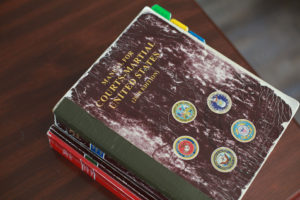
I thought I had settled on a good book title. Among other things, however, it also seemed to produce an apparently irresistible urge for people to ask, “why was it only something like treason.”
World War II was well before we became a nation that doesn’t believe what is right before our eyes. Conspiring to form a guerilla army and blow up transportation and communications hubs to disrupt the American war effort at home sure looked like treason. At least the FBI and the Army thought so.
But something merciful was brewing. Defeated Germany was still smoking and Japan was still fighting in 1945 when the military’s judicial branch realized that what looked like certain crimes during wartime were going to look different through peacetime eyes. During the prior five years of stupendous carnage, courts-martial were staffed and judged by officers whose interests were often weighted toward maintaining discipline, as opposed to dispensing justice,
Some charges – including those against the apparently treasonous men in “Something Like Treason” – began to look excessive.
So did their sentences. So in the spring of 1945, the military began to review 28,717 sentences of its soldiers still in confinement. A National Defense University study eventually found that 85% of them had their sentences remitted or reduced.
“Clemency,” study author Col. James J. Smith concluded, “was big business during this period.” The military had other motives. With most of its soldiers heading home, it needed to replenish its numbers to meet the rising Soviet threat. A good 27,000 formerly disciplined men were thus returned to service during the next three years.